- Home
- Diana Wynne Jones
Fire and Hemlock Page 3
Fire and Hemlock Read online
Page 3
“I don’t know about sisters!” Polly protested.
They wandered round the overgrown garden, arguing about it. In the end, Polly found she had to give way about Edna and make her a sister after all. Mr Lynn was just quietly adamant over it, and he would not budge. He gave in to Polly on most other things, but not on that.
“Must I kill dragons?” he said, rather pleadingly, as they came up to the house from the back somewhere.
“Yes,” said Polly. “It’s what our kind of heroes do.”
“But most dragons seem to have rather interesting personalities – besides probably having quite good reasons for what they do, if only one could understand them,” Mr Lynn objected. “And almost every dragon-slayer I ever heard of came to a sticky end in the end.”
“Don’t be a coward,” said Polly. “St George in my book didn’t come to a sticky end.”
“I’m nothing like St George,” said Mr Lynn. “He didn’t wear glasses.”
This was true, even though Polly had always imagined St George as tall and thin like Mr Lynn. He seemed so unhappy that she relented a little. “We’ll keep the dragon to the end, then, for when we’re properly trained.”
“That’s a good idea,” Mr Lynn said gratefully. “Now come over here. There’s something I think you’ll like.”
He led the way up the lawn, against the gusts of the wind, right up to the house. Three stone steps there led up to a closed door. On either side of the steps there was a short stone pillar with a stone vase on top of it. Mr Lynn stretched his arms out so that he had a hand on each stone vase. “Are you looking?” he said, standing in his bowed way between them. Like Samson in my book, Polly thought, getting ready to pull the temple down.
“Yes,” she said. “What?”
“Watch.” Mr Lynn’s hand moved on the right-hand vase. The vase began to spin slowly, grating a little. Two, three heavy turns and it stopped. Now Polly could see there were letters engraved on the front of the vase.
“HERE,” she read.
“Now watch again,” said Mr Lynn. His big left hand spun the other vase. This one went round much more smoothly. For a while it was a grey stone blur. Then it grated, slowed, and settled, and there were letters on it too.
“NOW,” Polly read. “NOW – HERE. What does that mean?”
Mr Lynn spun both vases, one slowly, grinding and groaning, the other smooth and blurring. They both stopped at exactly the same time.
WHERE, said the one on the left. NOW, read the right-hand one.
Upon which, Mr Lynn spun them again. This time when they stopped, the vases read NO and WHERE.
“Oh I see!” said Polly. “NOWHERE! That’s clever!” She moved sideways to look round the curve of the vases and found they still said NOWHERE, though this was because the left-hand vase now seemed to say NOW and the right-hand one HERE from where she had moved to. Both vases really said NOWHERE, but the letters were so arranged on them that you could never see the whole word at once on the same vase. Polly made sure, by going right up to them, ducking under Mr Lynn’s arm, and putting her head sideways to read the letters round the other side.
“Yes that’s right,” Mr Lynn said. “They both say NOWHERE really.” He spun them again, the slow grinding one and the fast smooth one, and this time they came up with HERE – NOW.
“Heroes see things like that,” he said.
“It’s obviously an enchantment of some kind,” Polly agreed, humouring him.
“It must be,” he said. It sounded as if he was humouring her.
Here, they both looked round, Polly was not sure why. The boy who had been at the funeral was standing behind them, still very smooth and neat in spite of the wind. Maybe he had snorted. At any rate, he was looking very scornful.
“Oh hello, Seb,” Mr Lynn said. “You got out at last, then?”
“Only because it’s over,” the boy said contemptuously.
“Is it? Thank goodness for that!” Mr Lynn said.
Instead of answering, the boy simply turned round and walked away. Mr Lynn’s face, Polly thought, showed just a trace of hurt feelings.
“What a horrible, rude boy!” Polly exclaimed, hoping it was loud enough for the boy to hear as he walked. But he walked very quickly and was out of sight round the corner of the house before she had finished saying it. “What relation is he?” she asked.
“Son of Laurel’s cousin – distant enough,” Mr Lynn said. He stood looking the way the boy had gone, in an absent, unhappy way that made Polly uncomfortable. But when he looked down at her, he seemed quite cheerful. “I think we could risk going back in again now,” he said. “They tell me I’m allowed to choose some of the old lady’s pictures. Would you like to help me choose?” He held out his hand to Polly and smiled.
Polly almost took hold of it. Then she backed away. Mr Lynn stayed with his hand awkwardly stretched out, and the smile died off his face, leaving it perplexed and a good deal more hurt than he had looked over Seb’s rudeness. “What’s the matter?” he asked.
It made Polly feel mean as well as dishonest. “I’m not a relation,” she blurted out. She could feel her cheeks stinging as they turned red. “I came in by mistake. I thought Nina was in there – being silly, you know.”
“I had an idea it was something like that,” Mr Lynn said rather sadly. “So you’re not coming?”
“I – I will if you want me to,” Polly said.
“I’d be very much obliged if you would,” said Mr Lynn.
His hand was still stretched out. Polly took hold of it, quite extraordinarily glad to have told him the truth, and they went on round the house the way Seb had gone.
“So my first giant is to be in the Stow-Whatsis supermarket,” Mr Lynn said as they turned the corner.
“Quite a small one, or he wouldn’t fit,” Polly said consolingly. This side of the house was the grand front. There was a large space of gravel with cars parked in it. These must have been the cars they had heard which had made Nina think they were coming to the road. Polly wondered where Nina was, but she was far too interested in her own adventures to worry about Nina. Numbers of people, dark-dressed and sober from the funeral, were drifting out of the open front door of Hunsdon House and wandering about on the gravel. Some seemed to have come out for fresh air. Some were getting into cars to leave.
Polly and Mr Lynn went along the side of the house to the front door. “Even a small one would get into the local papers,” Mr Lynn said. “What do we say to the reporters?”
“Leave all the interviewing to me,” Polly said grandly.
Perhaps it was a strange conversation. Perhaps this accounted for the unfriendly looks they got from the people round the front door. Some pretended not to notice Polly and Mr Lynn. Others said, “Hello, Tom,” but they said it in a grudging sort of way, and raised their eyebrows at Polly before they turned away. By the time she and Mr Lynn had edged their way inside into the grand hall again, Polly was sure this had nothing to do with their conversation. The people crowding the hall, she could somehow tell, were the most important members of the family. Every one of these gave Mr Lynn a disapproving look – if they bothered to notice him at all – before turning away. Before they had pushed their way halfway across to the stairs, Polly did not wonder that Mr Lynn had wanted her to keep him company indoors.
The one person who spoke to Mr Lynn was a man Polly did not like at all. He turned right round, in the middle of talking to someone else, in order to stare at Mr Lynn and Polly. He was a big, portly person with a dark, pouchy piece of skin under each eye.
“Slithering off as usual, are you, Tom?” he said jovially. It was not nearly as jolly as it sounded.
“No, I’m still here, Morton, as you see,” Mr Lynn said, ducking his head apologetically.
“Then stick around,” the man said, “or you’ll be in real trouble.” He laughed, to pretend it was a joke. It was a deep, chesty laugh. Polly thought of it as a fatal laugh, the way you think about a bad cough. The man turned away
, laughing this chesty laugh. “Laurel told me to tell you,” he said, and went back to talking to the person he had turned away from.
“Thanks,” Mr Lynn said to his back, and towed Polly on across the hall.
They had reached the foot of the jointed staircase when the servitor politely stopped them. “I beg your pardon, sir. Will you or the little girl be staying for lunch?”
“I don’t—” Mr Lynn began. He stopped and looked down at Polly, rather dismayed. He had obviously forgotten she was not supposed to be there. “No,” he said. “We’ll be leaving almost at once, thank you.”
The servitor said, “Thank you, sir,” and went away.
Polly did not blame Mr Lynn for not doing what the laughing man had told him to do. “Who was that man?” she whispered as they went up the stairs.
“One of the caterers, I think,” said Mr Lynn.
“No, silly! The one with black poached eyes,” Polly whispered.
That made Mr Lynn utter a yelp of laughter, guiltily cut short. “Oh, him? That’s Seb’s father, Morton Leroy. He and Laurel are probably going to get married. The pictures are in here.”
Polly had hoped that they would be going right up the stairs, round all the joints, so that she would have a chance to investigate the upstairs of Hunsdon House. But the room Mr Lynn went into was off a half-landing, only one short flight up. It was a small, bare place. There were marks on the carpet where furniture had stood for a long time and then been taken away. The pictures were leaning against the walls to left and right, in stacks.
“Some of these, as I remember, were very nice,” Mr Lynn said. “Suppose we lean all the ones we think are worth taking against the wall under the window, and then consider which to take. I was told I could have six.”
As soon as they started looking at the pictures, Polly discovered that the ones leaning on the left-hand wall were by far the most interesting. She left Mr Lynn to sort through the ones on the other side of the room, and knelt facing the left wall, using her chin and stomach to prop the front pictures on while she leafed over the ones behind like the pages of a heavy book. She found a green, sunlit picture of old-fashioned people having a picnic in a wood, in a pile that was otherwise only saints with cracked gold paint on their halos. The next pile had a strange, tilted view of a fairground, a lovely Chinese picture of a horse, and some sad pink-and-blue Harlequins beside the sea. Polly put all these against the end wall at once. The one on top of the third pile she liked too. It was a swirly modern painting of people playing violins. Underneath that was a big blue-green picture of a fire at dusk where smoke was beginning to wreathe round the vast skeleton of a plant like cow parsley in front. Polly exclaimed with delight at it.
Meanwhile, Mr Lynn was saying, “I don’t remember half these pictures. Take a look at this. Dismal, isn’t it?”
Polly swivelled round to be shown a long brownish picture, more like a drawing, of a mermaid carrying a dead-looking man underwater. “It’s awful,” she said. “They’ve got silly faces. And the man’s body is too long.”
“I agree,” said Mr Lynn, “though I think I may take it as a curiosity. Explain how you got into this house by mistake.”
Polly got up and carefully carried the violin picture and the smoke picture to the end wall. “Nina started it,” she said. “But I got just as silly.” And she told him about the High Priestesses, and how they had climbed out of Granny’s garden into all the others. “Then we had to hide behind some sheets on the washing line,” she was saying, when she saw Mr Lynn stand up and, in a flurried sort of way, brush at the knees of his suit.
“Oh hello, Laurel,” he said.
The lady Polly had mistaken for Nina was standing in the doorway. Seen this close, she struck Polly as plump and quite pretty, and her black clothes were obviously very expensive. Her hair was rather strange, light and floating, of a colour that could have been grey or no colour at all. Polly somehow knew from all this, and most of all from a powerful sort of sweetness about this lady, that she was the one who had inherited almost everything in the house. And from the stiff way Mr Lynn was standing there, she also knew that Laurel was the ex-wife he had talked about. She just could not think how she had taken her for Nina.
“Tom, didn’t you know I’d been asking for you?” Laurel said. Then before Mr Lynn could do more than begin to shake his head – he was going to lie about that, Polly noticed with interest – Laurel’s eyes went first to the pictures and then to Polly. Polly jumped as the eyes met hers. They were as light as Laurel’s hair, but with black rings in the lightness, which made them almost seem like a tunnel Polly was looking down. They had no more feeling than a tunnel, either, in spite of the sweet look on Laurel’s face.
“When you choose your pictures, Tom,” Laurel said, looking at Polly, “don’t forget that the ones you can have are the ones over there.” Light caught colours from her rings as her hand pointed briefly to the right-hand wall. “The ones against the other wall are all too valuable to go out of the family,” she said.
Then she turned round and went out onto the landing, somehow taking Mr Lynn out there along with her. They half shut the door. Polly stood by the window and heard snatches of the things they said beyond the door. First came Laurel’s sweet, light voice saying “…all asking who the child is, Tom.” To which Mr Lynn’s voice muttered something about “…in charge of her… couldn’t just leave her…” She could tell Laurel did not like this, because she seemed pleased when Mr Lynn added “…away shortly. I’ve a train to catch.” One thing was clear: Mr Lynn was very carefully not telling Laurel who Polly was or how she got there.
Polly leaned against the window, looking down at the cars on the gravel, and considered. She was scared. She had thought it would be all right to come back into the house if Mr Lynn asked her to. Now she knew it was not. Mr Lynn was having to be artful and vague in order to cover it up. Laurel was frightening. Polly could hear her arguing with Mr Lynn now, out on the landing, her voice all little angry tinkles, like ice cubes in a drink. “Tom, whether you like it or not, you are!” And a bit later: “Because I tell you to, of course!” And later still: “I know you always were a fool, but that doesn’t let you off!”
Listening, Polly began to feel angry as well as scared. Laurel was a real bully, for all her voice was so sweet. Polly went over to the pictures on the other side of the room, the ones Mr Lynn was allowed to have. Sure enough, as she had expected, they were nothing like as good as the ones on the left-hand side. Most of them were terrible. Since the argument was still going on, outside on the landing, Polly tiptoed back to the pictures she had leaned against the wall by the window. Back and forth she tiptoed, putting all the good, interesting pictures she had already chosen into the stacks against the right-hand wall, and a few, not so terrible, to lean on the wall by the window, to look as if they had been chosen.
Then, to make things look the same as before, she took terrible pictures from the right-hand wall to the left-hand stacks. They ended up a complete mixture. When Mr Lynn came back into the room, Polly was kneeling virtuously by the right-hand wall, taking her mind off her evil deed by studying a picture called The Vigil, of a young knight praying at an altar.
“Do you think he’s a trainee-hero?” she asked Mr Lynn.
“Oh no. Put that back,” he said. “Don’t you think it’s soppy?”
“It is a bit,” Polly agreed cheerfully, and watched Mr Lynn choose pictures through her hair while she slowly put The Vigil back.
That was how she got Fire and Hemlock, of course. When he sorted through the doctored stacks, Mr Lynn picked out every one of the pictures Polly had chosen. “I didn’t know this would be here!” he said, and, “Oh, I remember this one!” He was particularly pleased by the swirly one of the violins. When he came to the picture of the fire at dusk, he smiled and said, “This photograph seems to haunt me. It used to hang over my bed when I lived here. I always liked the way the shape of that hemlock echoes the shape of that tree in the hedge. Here
,” he said, and put it in Polly’s hands. “You have it.”
Polly was awed. She had never owned a picture before. Nor had she expected to profit from her bad deed. “You don’t mean I can keep it?” she said.
“Of course you can,” said Mr Lynn. “It’s not very valuable, I’m afraid, but you’ll find it grows on you. Keep it instead of a medal for life-saving.” At this, Polly tried to say thank you properly, but he cut her short by saying, “No, come on. I think your Granny may be worried about you by now.”
Mr Lynn had to carry the picture, along with his five others. It bumped against Polly’s legs as she walked, which threatened to break the glass. The other funeral guests were having lunch by then. Polly could hear the chink of knives and forks as they hurried through the empty hall. Polly was glad. She knew, if they met Laurel on the way out, Laurel would know at once that Mr Lynn had all the wrong pictures.
Thinking of Laurel, as she trotted beside Mr Lynn down the windy road, caused Polly, for some reason, to say, “When I come to work as your assistant in your ironmonger’s shop, I’m going to pretend to be a boy. You pretend you don’t know.”
“If you want,” said Mr Lynn. “As long as that doesn’t mean cutting your lovely hair.”
The lovely hair was blowing round Polly’s face and getting in her mouth and eyes. “It’s not lovely hair!” she said crossly. “I hate it. It drives me mad and I want it cut!”
“I’m sorry,” said Mr Lynn. “Of course. It’s your hair.”
“Oh!” said Polly, exasperated for no real reason. “I do wish you’d stop agreeing all the time! No wonder people bully you!” They came to Granny’s front gate then. “You can give me my picture now,” Polly said haughtily.
Mr Lynn did not reply, but he looked almost haughty too as he passed the picture over. The silence was all wind blowing and leaves rattling, and most unfriendly. But Granny had clearly been looking out for Polly. As Polly hitched the picture under her armpit and managed to get the gate unlatched, the front door banged open. Mintchoc came out first. For some reason, she put her back and tail up and fled at the sight of them. Granny sailed out second, like a rather small duchess.

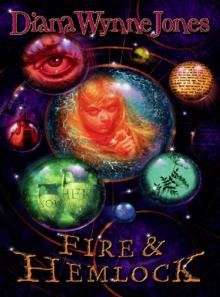 Fire and Hemlock
Fire and Hemlock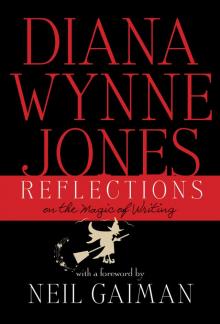 Reflections: On the Magic of Writing
Reflections: On the Magic of Writing The Game
The Game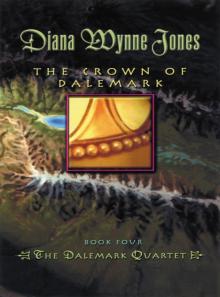 The Crown of Dalemark
The Crown of Dalemark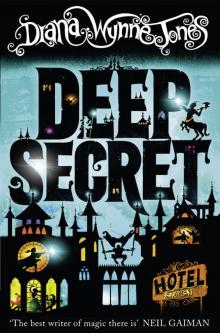 Deep Secret
Deep Secret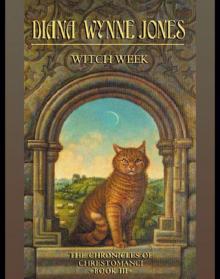 Witch Week
Witch Week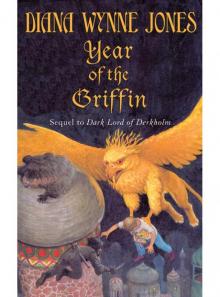 Year of the Griffin
Year of the Griffin Wild Robert
Wild Robert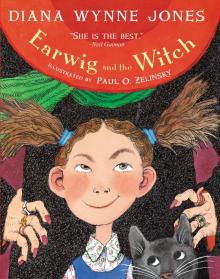 Earwig and the Witch
Earwig and the Witch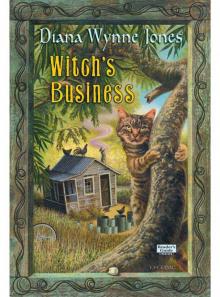 Witch's Business
Witch's Business Dogsbody
Dogsbody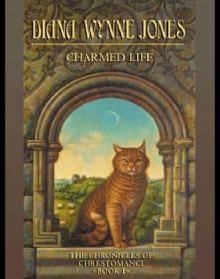 Caribbean Cruising
Caribbean Cruising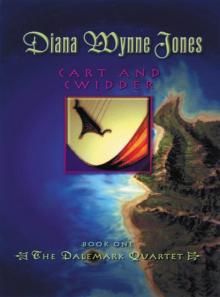 Cart and Cwidder
Cart and Cwidder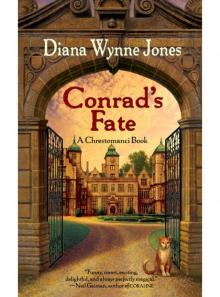 Conrad's Fate
Conrad's Fate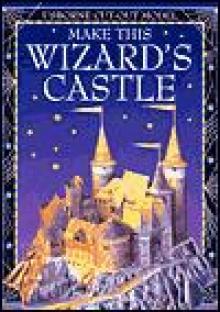 Howl's Moving Castle
Howl's Moving Castle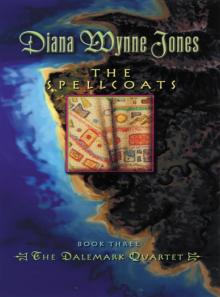 The Spellcoats
The Spellcoats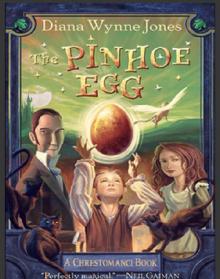 The Pinhoe Egg
The Pinhoe Egg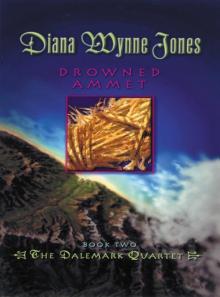 Drowned Ammet
Drowned Ammet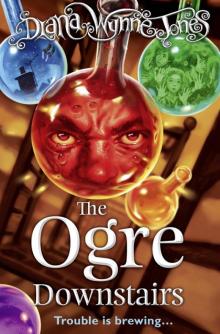 The Ogre Downstairs
The Ogre Downstairs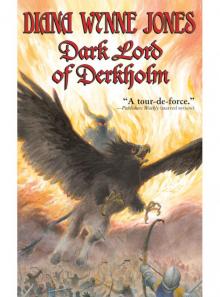 Dark Lord of Derkholm
Dark Lord of Derkholm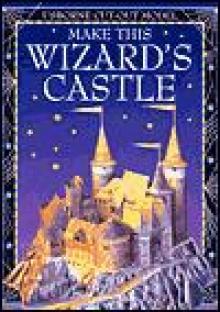 Castle in the Air
Castle in the Air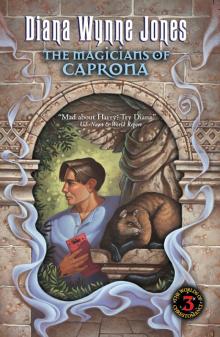 The Magicians of Caprona
The Magicians of Caprona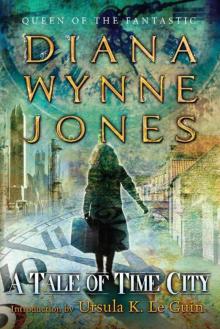 A Tale of Time City
A Tale of Time City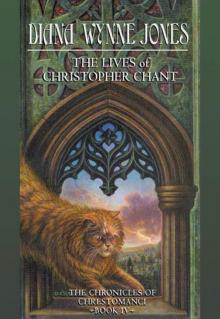 The Lives of Christopher Chant
The Lives of Christopher Chant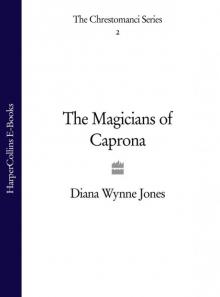 The Magicians of Caprona (UK)
The Magicians of Caprona (UK)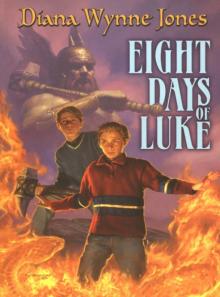 Eight Days of Luke
Eight Days of Luke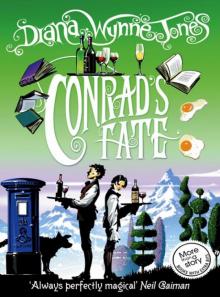 Conrad's Fate (UK)
Conrad's Fate (UK)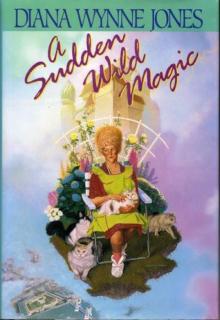 A Sudden Wild Magic
A Sudden Wild Magic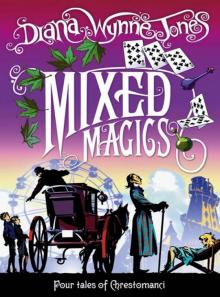 Mixed Magics (UK)
Mixed Magics (UK)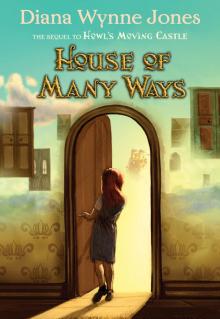 House of Many Ways
House of Many Ways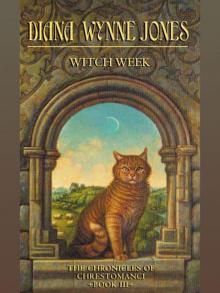 Witch Week (UK)
Witch Week (UK)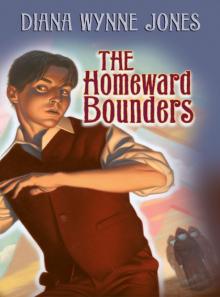 The Homeward Bounders
The Homeward Bounders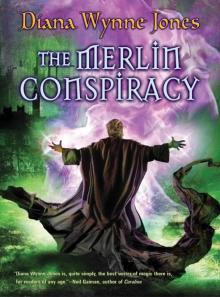 The Merlin Conspiracy
The Merlin Conspiracy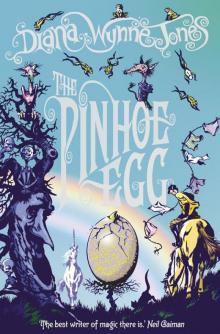 The Pinhoe Egg (UK)
The Pinhoe Egg (UK)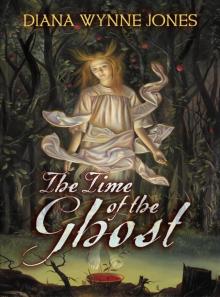 The Time of the Ghost
The Time of the Ghost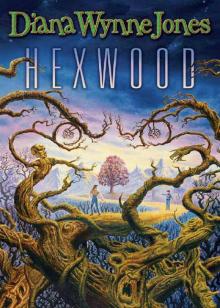 Hexwood
Hexwood Enchanted Glass
Enchanted Glass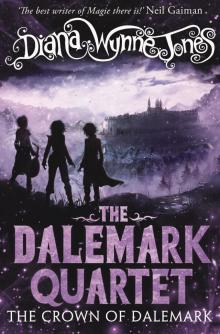 The Crown of Dalemark (UK)
The Crown of Dalemark (UK)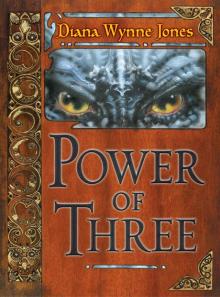 Power of Three
Power of Three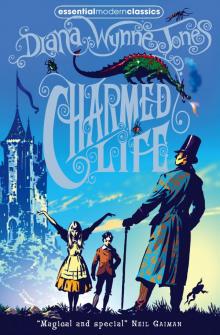 Charmed Life (UK)
Charmed Life (UK)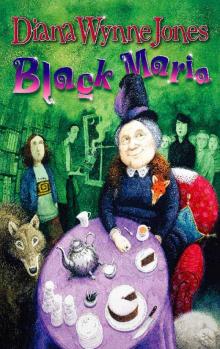 Black Maria
Black Maria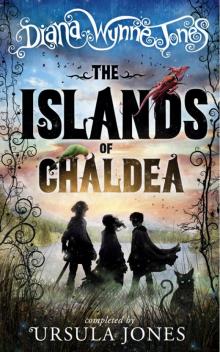 The Islands of Chaldea
The Islands of Chaldea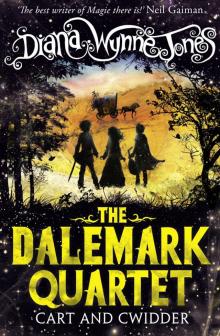 Cart and Cwidder (UK)
Cart and Cwidder (UK)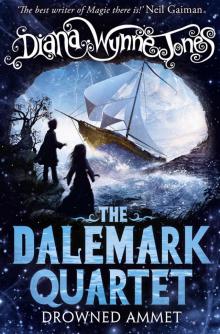 Drowned Ammet (UK)
Drowned Ammet (UK)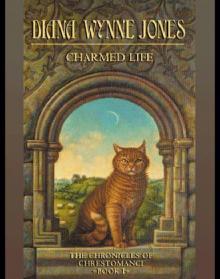 Charmed Life
Charmed Life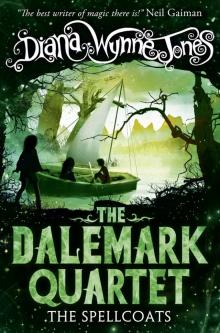 The Spellcoats (UK)
The Spellcoats (UK)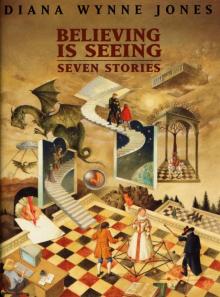 Believing Is Seeing
Believing Is Seeing Samantha's Diary
Samantha's Diary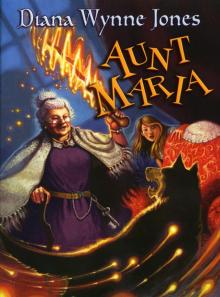 Aunt Maria
Aunt Maria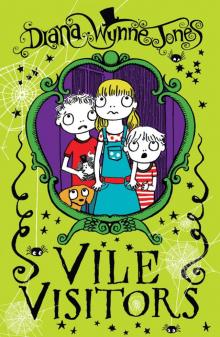 Vile Visitors
Vile Visitors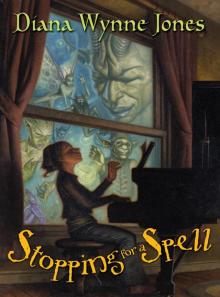 Stopping for a Spell
Stopping for a Spell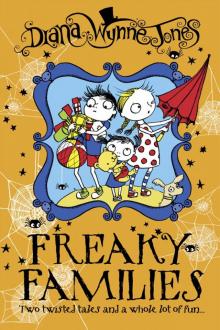 Freaky Families
Freaky Families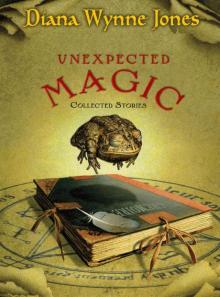 Unexpected Magic
Unexpected Magic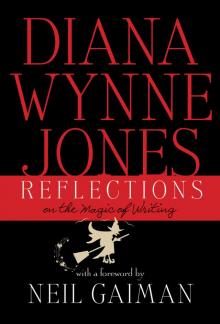 Reflections
Reflections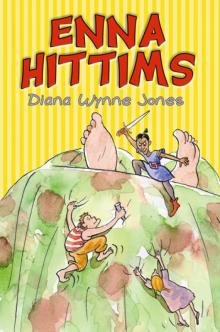 Enna Hittms
Enna Hittms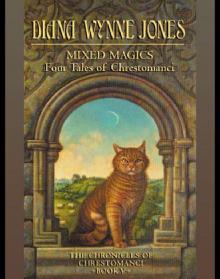 Mixed Magics: Four Tales of Chrestomanci
Mixed Magics: Four Tales of Chrestomanci